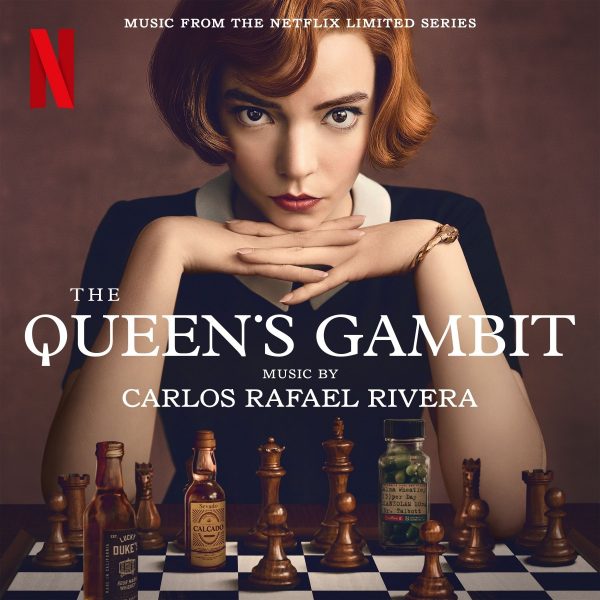Carlos Rafael Rivera is an Emmy award winning composer who has worked exclusively with Scott Frank on projects including Godless. Musician, lecturer and accomplished conversationalist he is self-effacing about his contributions. Carlos remains pragmatic on the topic of his process and is fully aware of the fortunate position he finds himself in. He recently took time out to talk to Martin Carr about The Queen’s Gambit, his latest collaboration with Scott Frank due to arrive on Netflix this October.
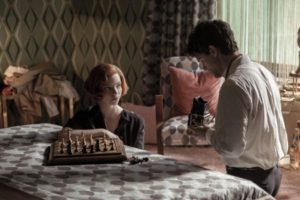
How did your involvement in The Queen’s Gambit come about?
Scott Frank the director reached out to me because we had worked together before. We have a long relationship spanning seventeen years and goes back to when I met him and became his guitar teacher. I was a student at university and had put flyers up in the area and he reached out to me. When I walked into his office and saw these posters on the wall from Minority Report, Out of Sight, Dead Again and Little Man Tate I discovered he was a writer. I had a little fanboy moment and then just started teaching him guitar. When I got home and told my wife about him and the films he had written, she was like ‘that’s nice, help with the dishes please’. So that was the beginning of it but I never thought we would ever work together. It’s surreal because my job was to be his guitar teacher but I was studying classical music composition, mentoring with Randy Newman and doing all these things at the university. We became friends over time but Scott made his directorial debut two years after I started giving him lessons, but he got James Newton Howard for that. So I taught him how to communicate with the composers musically so that his ideas could be better understood.
After five years or so he asked why I had never approached him to get involved with the film side of things, I simply explained that my role was as his guitar teacher. For me I never like people who use friends to gain an advantage, which to me is a weird abuse of the relationship. When you are working with someone and collaborating there is a pecking order and it a big team. For it to work you need to understand where you are in that picture, which not everyone can which is when people get replaced. Everyone is focused on their one thing and the more you can collaborate within that the better it will end up being.
How has your working relationship with Scott developed over time?
I have been fortunate to work with Scott and balance that by teaching at university. So the day job for me has been going on since I was seventeen, either with private lessons or now at the academic level of high school music. My film work has slotted around that as the schedule for Scott’s projects are very long and we often start working together before any screenplay is written. So there is a two year time frame which leads towards this moment, in which the schedule gets insane towards the end. I feel very lucky because working with people this good only makes me a better musician and it’s not just Scott. There is Wylie Stateman the sound designer who worked on Once Upon A Time In Hollywood and we call him Obi-Wan Kenobi. It always feels like I go back to college when I work with Scott on his projects, because the level his teams are concerned with is so high that you have to set up.
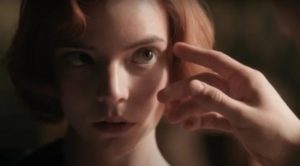
What do you think are the benefits of having that academic outlet and also the practical side, which is obviously your composition?
There are two kinds of conversation we could have, one would be over the drinks, while the other would be more serious. It’s true, because there is a certain aspect of uncertainty in this field but if you are lucky you have a shelf life in this industry. I am old enough to have seen both sides and education for me has always been so rewarding, because this is what I am passionate about. There is a certainty in that position, but I am always teaching people on the way up who have that passion I had when I started out. So as soon as I feel like a curmudgeon which happens as you get older, when these people share their musical tastes and passion it always brings me back. They are always listening to what is current so I get to vicariously stay in touch with what is happening musically. The students should always be informing my thinking on what I do, because you can see the next generation and how much better they are going to be than we are. I have never subscribed to the idea that things were better before. The technology is better now and music is constantly improving for whatever genre is popular at that time. I am excited because I get to be connected to a new generation every year.
What did the initial creative conversations with Scott focus on?
It was clear we were going to have to do a lot of heavy lifting musically on this project. Author Walter Tevis describes Beth looking up at the ceiling and visualising her chess games which I always read as ominous figures. It was always a challenge to think about and could have failed hard if the effects had not been so brilliant. I thought there was going to be a template so every time a game appeared there would be some kind of music, but realised if we worked with the music contextually within each scene things made more sense. For example if it focused on character so would the music, whereas if it was leading to a game then musically things would become more balletic in nature. It was essential to figure out where things were leading and having done that I finally cracked the code.
I was really struggling for a while because this was a tough gig for every reason if you think about it. This deals with madness and addiction within the confines of an orphanage, set during a certain period in time making tone really difficult to pin down. That is the one thing directors and producers need to feel where music is addressing unspoken stuff. It took a long time to get and I am really grateful that Scott trusted me to do it, because for a while I was lost at sea. At one point Scott said ‘you’re scoring the wrong movie’ and he was right. However, those are the real conversations to have because it’s really easy to say how great something is and with this that didn’t happen. I was dealing with the reality of trying to get this tone right and it’s an unspoken music which you can’t touch but only experience. Bridging that gap with producers and directors is the job we have and it is never to edify or teach them anything. Our job is to support their vision and once they feel the music we are providing is correct then we can celebrate. Up until then you get your head down, tell the story and ask what is it they want to do.
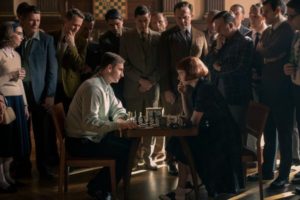
You could describe The Queen’s Gambit as a rites of passage story, how would you say you have illustrated that journey musically?
Scott really wanted a piano based score and what I wanted to do was present Beth in the orphanage as she starts her journey, within this cold lonely place. Musically it would be piano only but whenever she starts imagining the chess games it becomes fully orchestral. What is in her head is fully formed, realised and complete while outside that it remains just piano and cello. Only as she gets older and moves away from the orphanage did we put in more orchestral elements. By the time we get to the USSR there is no piano and we have a full orchestra. Being able to do that arc was the goal and I think it mostly worked, but I never talked to Scott about this. My goal with the director or producer is their approval, this nerdy stuff I am sharing with you now motivated me to work.
How important do you think it was to have chess represented musically within your score?
I think the game represents a canvas upon which Beth’s story takes place. It is a story about genius in any field but chess is unfortunately not very cinematic. If you can’t make people care about this game it will be a really hard sell. Chess is an amazing game but visually very hard to represent and very hard not to come off as snobbish as well. Music like chess comes with the same exact apologetic story when you talk to people at parties, who talk about trying it for a few years but things never working out. In terms of subject matter and movies it comes with the same energy when it comes to watching that on screen. So when we did this it was approached very much in terms of character and Anya Taylor-Joy is incredible. She really helps carry this and everyone in the show is just exceptional.
To what extent do you think the score underpins Beth’s emotional and intellectual journey?
I read the novel before I got to work on this and within that Walter Tevis mentions classical music a lot. He talks a lot about chamber music and there is a change in the film from the novel where she is listening to Vivaldi and they leave her alone. Whereas in the show she is listening to pop music of the time, which is perfectly appropriate and helps us invest in the moment. In the novel though it’s all about classical and I thought I would have to write loads of multiple line stuff, because this is chess which kind of needs it.
Through the novel’s constant references to classical music it became apparent we were going to need a lot of counterpoint, eluding to the complications which can be brought out by having multiple lines coming out at the same time. It is given that this is a game of two opposites where people make different moves in terms of point and counterpoint with the idea of two musical lines starting. Which lead to what the main theme is about in terms of it being a call and response kind of piece. Music was represented orally in the main title but I knew the genre was going to be classical. All these were conversations I had which might have changed had Scott wanted to do something else.
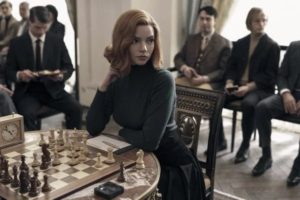
What are your key considerations you weigh up before signing on to any project?
The story has to be gripping and I am lucky because Scott is one of the best writers in this industry. To be honest I just like reading his emails because they are so well put together. Seriously though if the story is good it doesn’t matter. It could be a comedy, a superhero movie or film noir. With Scott I feel I have been fortunate to deal with three very different things in A Walk Amongst the Tombstones, his love letter to the western genre in Godless and now this underdog story which is sort of like Rocky.
Describe for me your perfect Sunday afternoon.
Going to Star Wars: Galaxy’s Edge in a reopened Hollywood studios Disney theme park with my wife and kids. Right after a fantastic lunch at the Brown Derby with coffee in hand about to ride Rise of the Resistance.
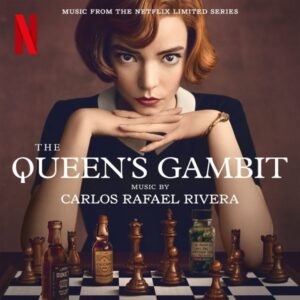
Many thanks to Carlos Rafael Rivera for taking the time for this interview.



